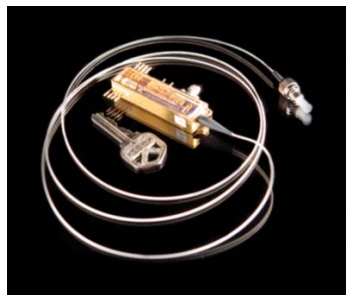Government Lab Reveals It Has Operated Quantum Internet for Over Two Years
A quantum internet capable of sending perfectly secure messages has been running at Los Alamos National Labs for the last two and a half years, say researchers
The Physics arXiv Blog
May 6, 2013

One of the dreams for security experts is the creation of a quantum internet that allows perfectly secure communication based on the powerful laws of quantum mechanics.
The basic idea here is that the act of measuring a quantum object, such as a photon, always changes it. So any attempt to eavesdrop on a quantum message cannot fail to leave telltale signs of snooping that the receiver can detect. That allows anybody to send a one-time pad over a quantum network which can then be used for secure communication using conventional classical communication.
That sets things up nicely for perfectly secure messaging known as quantum cryptography and this is actually a fairly straightforward technique for any half decent quantum optics lab. Indeed, a company called ID Quantique sells an off-the-shelf system that has begun to attract banks and other organisations interested in perfect security.
...
Having run this system now for over two years, Los Alamos are now highly confident in its efficacy.
Of course, the network can never be more secure than the hub at the middle of it and this is an important limitation of this approach. By contrast, a pure quantum internet should allow perfectly secure communication from any point in the network to any other.
Another is that this approach will become obsolete as soon as quantum routers become commercially viable. So the question for any investors is whether they can get their money back in the time before then. The odds are that they wont have to wait long to find out.
Government Lab Reveals It Has Operated Quantum Internet For Over Two Years | MIT Technology Review
A quantum internet capable of sending perfectly secure messages has been running at Los Alamos National Labs for the last two and a half years, say researchers
The Physics arXiv Blog
May 6, 2013

One of the dreams for security experts is the creation of a quantum internet that allows perfectly secure communication based on the powerful laws of quantum mechanics.
The basic idea here is that the act of measuring a quantum object, such as a photon, always changes it. So any attempt to eavesdrop on a quantum message cannot fail to leave telltale signs of snooping that the receiver can detect. That allows anybody to send a one-time pad over a quantum network which can then be used for secure communication using conventional classical communication.
That sets things up nicely for perfectly secure messaging known as quantum cryptography and this is actually a fairly straightforward technique for any half decent quantum optics lab. Indeed, a company called ID Quantique sells an off-the-shelf system that has begun to attract banks and other organisations interested in perfect security.
...
Having run this system now for over two years, Los Alamos are now highly confident in its efficacy.
Of course, the network can never be more secure than the hub at the middle of it and this is an important limitation of this approach. By contrast, a pure quantum internet should allow perfectly secure communication from any point in the network to any other.
Another is that this approach will become obsolete as soon as quantum routers become commercially viable. So the question for any investors is whether they can get their money back in the time before then. The odds are that they wont have to wait long to find out.
Government Lab Reveals It Has Operated Quantum Internet For Over Two Years | MIT Technology Review


